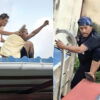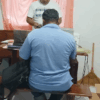FOR recreational sailboaters, one of the great ambitions is to cross the Pacific. Even a shorter run of, say, Hawaii to the mainland would be the trip of a lifetime. Bill and Simone Butler had bigger ideas. In 1989 they set out to sail around the world and had made it to a point 1200 miles west of Panama when things stopped going according to plan. The Butlers were about to learn what the Robinsons had learned seventeen years earlier: this part of the ocean is anything but pacific.
On the night of June 15, the Butlers sailed the 38-foot Siboney over a calm sea. Suddenly they found themselves among a large pod of whales which they presumed were orcas, though they could not see very clearly. But they discerned some were small and others large and guessed they were mothers and children. The Butlers reveled in this personal and up-close interaction with nature, which lasted quite a while. The size and power of orcas, also known as killer whales, can be exhilarating.
The mood changed when several larger bodies emerged. The orcas began acting differently, as if nervous or agitated, and the Butlers wondered what it could be since they had not done anything out of sorts. The larger ones were males who must have thought the family was in danger, because they positioned themselves between the boat and the rest of the pod. Then they attacked.
The bulls started to rub aggressively against the hull of the Siboney. She lurched sideways under the weight of the shoves. Then the head-on attacks came. One shook the vessel violently, the next punctured her, the last delivered a fatal blow.
Simone ran below deck to discover that water poured in through a gaping wound. The bilges were overwhelmed in a matter of minutes and Bill knew they needed to abandon ship. Without time to spare, the couple gathered relief supplies. Simone collected food and water while Bill prepared the life raft, the one he bought cheaply because he believed he would never use it. Having made the most of their final minutes with the Siboney, the couple cast off in the raft and hoped the orcas has moved on. A flimsy raft is no match for angry orcas.
The Butlers now drifted in a part of the sea that has claimed many vessels. Bill understood, but did not tell his wife, that he had sailed a course away from the well-travelled shipping lanes so as to avoid a collision at night. To their relief, the orcas were gone, but what came next was worse in many ways. As small aquatic creatures collected under the raft, larger fish collected under the creatures, and under them collected sharks. At first, they nudged the raft, similar to the way the orcas nudged the Siboney. But soon they forcefully bumped the rubber bottom, shoving the Butlers upward. It is a tactic related by hundreds of shipwreck survivors over the years. The bumping grew more aggressive over time as the sharks studied the craft, probing for a weakness.
The Butler’s greatest enemy was not the sharks, however, but thirst. They had no way of knowing in what direction they were drifting and could not gauge their speed. Their food ran out after a couple of weeks and they drank just enough water to stay alive.
After fifty-nine days they spotted land, but not a small island. This was a large land mass and they correctly guessed they had drifted east and were looking at the coast of Central America. For seven agonizing days they drifted along the shore, always too far out to swim. They thought of paddling but were too weak. Finally, on the sixty-sixth day since their boat was sunk by orcas, the Butlers were picked up by a Costa Rican patrol vessel.
I have often thought about how shipwreck stories are metaphors for life. Our vessel can be compared to our home and family, our work and way of life. Perhaps a fire destroys our home, we lose a job, or a cherished family member dies, turning our world upside down. Then it seems the sharks start to attack: bill collectors and others who take advantage of our desperate situation. After reading hundreds of stories like this one, it is clear that what separates survivors from those who perish is strength of will. We cannot always control whether our ship is sunk, but whether we reach shore or not is often in our own power.
BC Cook, PhD lived on Saipan and has taught history for 20 years. He currently resides on the mainland U.S.

BC Cook











